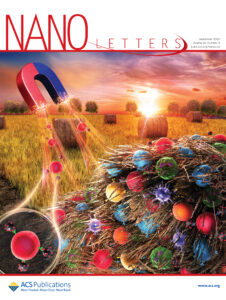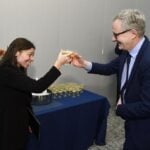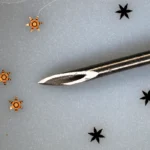Researchers Develop New Platform for High Throughput Analysis of Antigen-specific T Cell Responses

 In a paper published in the September issue of Nano Letters, INBT researchers Hai-Quan Mao (above center), INBT associate director and professor of materials science and engineering, Jonathan Schneck (above right), INBT affiliate faculty member and professor of pathology and oncology at the Johns Hopkins School of Medicine, and their team reported a series of technologies that streamline enrichment, expansion, and detection of a wide range of antigen-specific T cells for cancer, infectious disease, and autoimmunity. Led by John Hickey (above left), alum from the INBT and Department of Biomedical Engineering, and Ariel Isser, PhD candidate in the Department of Biomedical Engineering, the team developed a concept of “adaptive artificial antigen presenting cells,” which can target an array of T cell specificities and are compatible with a 96-well plate format to facilitate high-throughput enrichment and expansion of rare, endogenous T cells. Likewise, adaptive detection particles are designed to be both modular and sensitive enough to detect a variety of T cell specificities, including rare, cancer-specific T cells. Together, these tools can provide a facile, “off-the-shelf” means of studying antigen-specific T cell responses across many different diseases.
In a paper published in the September issue of Nano Letters, INBT researchers Hai-Quan Mao (above center), INBT associate director and professor of materials science and engineering, Jonathan Schneck (above right), INBT affiliate faculty member and professor of pathology and oncology at the Johns Hopkins School of Medicine, and their team reported a series of technologies that streamline enrichment, expansion, and detection of a wide range of antigen-specific T cells for cancer, infectious disease, and autoimmunity. Led by John Hickey (above left), alum from the INBT and Department of Biomedical Engineering, and Ariel Isser, PhD candidate in the Department of Biomedical Engineering, the team developed a concept of “adaptive artificial antigen presenting cells,” which can target an array of T cell specificities and are compatible with a 96-well plate format to facilitate high-throughput enrichment and expansion of rare, endogenous T cells. Likewise, adaptive detection particles are designed to be both modular and sensitive enough to detect a variety of T cell specificities, including rare, cancer-specific T cells. Together, these tools can provide a facile, “off-the-shelf” means of studying antigen-specific T cell responses across many different diseases.
This article has been curated and made freely available by the Immune Epitope Database and Analysis Resource (IEDB) with an IEDB Reference ID 1036997. The IEDB is sponsored by the National Institute of Allergy and Infectious Disease (NIAID). IEDB seeks to collate experimental data about T cell and antibody epitopes for a variety of diseases and across a range of animal species. This resource is provided to the scientific community at no charge.
The authors artwork was also featured on the cover. Using magnetic nanoparticles to “find the needle in the (immune cell) haystack”: Adaptive artificial antigen presenting cells (black) can isolate rare antigen-specific CD8+ T cells (red) from a “haystack” of irrelevant immune cells. Our method provides a multiplexed, streamlined method for simultaneous magnetic enrichment, expansion, and detection of a wide range of antigen-specific T cells for cancer, infectious disease, and autoimmunity.





